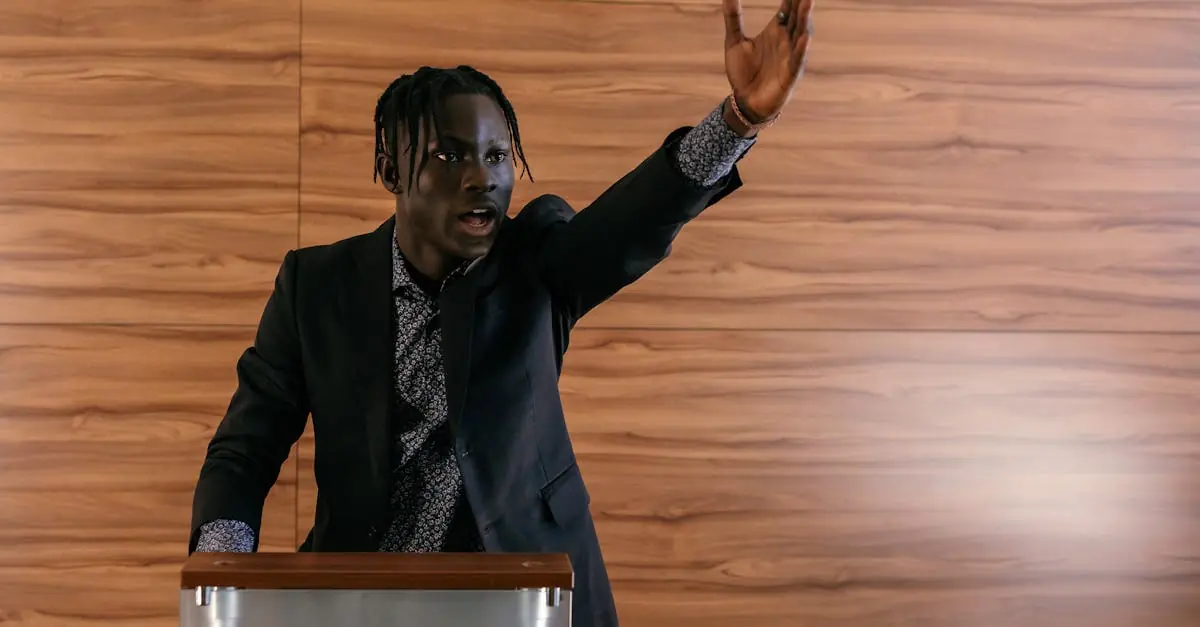Table of Contents
ToggleIn the world of politics, words wield power like a double-edged sword. One slip of the tongue can spark outrage or ignite support, and that’s where political speech scrutiny comes into play. Imagine a reality show where every contestant’s speech is dissected like a science project—welcome to the arena of public opinion!
Overview of Political Speech Scrutiny
Political speech scrutiny involves the critical examination of statements made by politicians. This analysis shapes public perception and influences political outcomes.
Definition of Political Speech
Political speech refers to any communication relating to government, political values, public policy, or political candidates. It includes speeches, debates, advertisements, and social media posts. The content of political speech often reflects the speaker’s views, intentions, and political agendas. Definitions may also vary based on legal and cultural contexts, with some jurisdictions offering protections under free speech laws. Effective political speech often resonates with voters while addressing key concerns and issues.
Importance of Scrutiny in Democracy
Scrutiny of political speech plays a vital role in a functioning democracy. An informed electorate relies on transparent communication to make decisions. Close analysis promotes accountability among politicians, encouraging them to uphold democratic values. Public discourse can influence policy debates and shape societal norms. Through scrutinizing political rhetoric, citizens can discern authenticity and manipulative messaging. Enhanced focus on political speech fosters a more engaged populace, ultimately strengthening democratic institutions.
Historical Context
Political speech scrutiny has evolved significantly over time, shaped by important events and legal rulings. Understanding this history provides insight into today’s political landscape.
Landmark Cases in Political Speech
Landmark cases have played a crucial role in defining the boundaries of political speech. Schenck v. United States (1919) established limitations by introducing the “clear and present danger” standard for free speech. New York Times Co. v. Sullivan (1964) expanded protections, requiring proof of actual malice for public figures in defamation cases. Citizens United v. FEC (2010) further transformed political speech by allowing corporations to spend unlimited funds on political campaigns. Each of these cases influenced how speech is interpreted and regulated, significantly impacting political discourse.
Evolution of Speech Regulations
Speech regulations have changed to reflect societal values and political climates. Early laws focused on sedition and censorship, punishing dissent and criticism of the government. Over time, the First Amendment increasingly protected free speech, promoting a more open dialogue. The rise of digital platforms has introduced new challenges, necessitating updated regulations that address misinformation and hate speech. Current laws continue to balance the need for free expression with the responsibility to protect individuals and communities from harmful rhetoric. As society evolves, so too will the frameworks governing political speech.
Current Standards and Regulations
Political speech scrutiny operates under a complex framework of federal and state regulations that shape the landscape of political communication.
Federal Laws Governing Political Speech
Federal laws play a crucial role in defining the boundaries of political speech. The First Amendment protects individuals’ rights to express political opinions without government interference. However, laws like the Federal Election Campaign Act establish regulations around campaign financing and advertising disclosures. Political speech now also faces scrutiny under the Bipartisan Campaign Reform Act, targeting the regulation of “soft money” contributions to political parties. Landmark court rulings, such as Buckley v. Valeo, have further established that spending money on political advocacy equates to protected speech. As a result, these federal provisions guide how candidates and organizations communicate their messages during elections, aiming to ensure transparency and accountability.
Role of State Regulations
State regulations add another layer to the scrutiny of political speech. Each state possesses its own election laws, which can vary significantly in scope and detail. Some states impose stricter rules on campaign finance and advertising compared to federal standards. In many jurisdictions, states require specific disclosures for political advertisements, ensuring voters are informed about funding sources. Certain laws aim to tackle issues such as misinformation and deceptive political ads. These regulations empower state authorities to monitor and address regional challenges related to political discourse, reflecting local cultural values and societal concerns. Ultimately, state-level oversight complements federal laws, enhancing the integrity of political communication across the nation.
Impacts of Political Speech Scrutiny
Political speech scrutiny significantly shapes the dynamics of political discourse, affecting both campaigns and societal expression.
Effects on Political Campaigns
Political campaigns face immense pressure due to scrutiny of candidates’ speeches. Every statement can sway voter sentiments, impacting election outcomes. Candidates with strong rhetoric often enjoy increased support, while poorly received remarks can lead to backlash. The analysis of debates and advertisements becomes crucial, as they often serve as the battleground for public opinion. Campaign strategies adapt to this environment, focusing on careful wording and presentation. As a result, messaging must align with voter expectations while adhering to legal guidelines, ensuring transparency and accountability.
Influence on Free Expression
Free expression in politics encounters challenges amidst heightened scrutiny. Politicians may censor themselves, fearing misinterpretation or backlash, which can limit open dialogue. The consequences can lead to a homogenization of political discourse, stifling diverse viewpoints. This cautious approach can disproportionately affect minority voices seeking to challenge the status quo. Public figures must navigate complex regulations and societal expectations, balancing authenticity and safety in their communications. Despite these hurdles, the fundamental right to speak freely remains essential, shaping democratic values and political engagement.
Challenges in Political Speech Scrutiny
Political speech scrutiny faces significant challenges, especially in navigating the balance between free expression and regulation.
Balancing Free Speech and Regulation
Challenges arise when protecting free speech while enforcing regulations. Federal laws like the First Amendment allow individuals to express opinions openly. Many political figures, however, experience fear of repercussions from their statements. This fear often leads to self-censorship, impacting the diversity of political discourse. States impose various regulations affecting how candidates communicate, sometimes restricting honest expression. Compromising between ensuring integrity in political messaging and allowing open dialogue proves difficult. Striking a balance demands continuous evaluation of existing laws against evolving societal norms.
The Role of Social Media Platforms
Social media platforms introduce unique challenges in political speech scrutiny. These platforms amplify voices and facilitate widespread discourse. Users often encounter misinformation and harmful rhetoric, complicating the task of oversight. Algorithms prioritize engagement, sometimes promoting divisive content over factual information. Regulatory bodies struggle to keep pace with technological advancements shaping political communication. Platforms must evolve policies to effectively moderate harmful speech while upholding users’ rights. Ensuring accountability on these platforms is vital for a healthy democratic process, demanding collaboration among tech companies, lawmakers, and civil society organizations.
Political speech scrutiny plays a crucial role in shaping the democratic landscape. By holding politicians accountable for their words, it fosters an informed electorate and encourages transparency. This scrutiny not only impacts campaigns but also influences societal expression.
As political discourse continues to evolve in the digital age, the challenges of misinformation and self-censorship become increasingly apparent. Balancing free expression with the need for integrity in communication remains essential.
The ongoing dialogue between lawmakers, tech companies, and civil society is vital for ensuring that political speech remains a tool for engagement rather than a source of division. Ultimately, a well-scrutinized political landscape strengthens democracy and empowers diverse voices to contribute to the public discourse.




